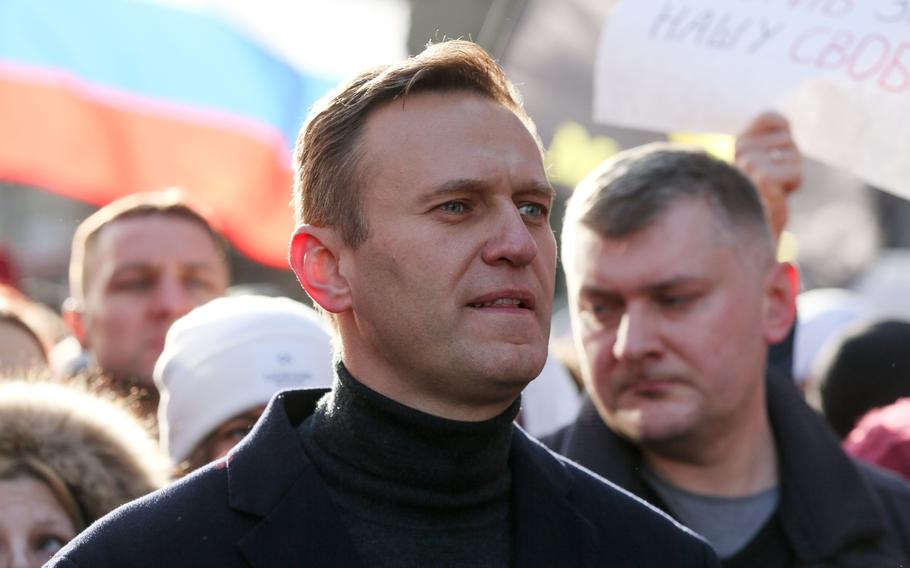Opinion
Political hostage-taking is embedded in Putin’s foreign policy strategy
Special to Stars and Stripes March 13, 2024

Alexey Navalny, Russian opposition leader, walks with demonstrators during a rally in Moscow on Feb. 29, 2019. (Andrey Rudakov/Bloomberg)
The recent execution of Alexei Navalny has reminded the world the cost of presenting a democratic opposition in an authoritarian regime. Thousands gathered to send him off to eternal peace at his Moscow funeral, despite the risk of the Kremlin’s repressions. To ensure that his sacrifice is not forgotten, the West needs to remember the broader issue of those who are sharing his path — Russia’s political hostages.
Mikheil Saakashvili, former president of Georgia, is another vivid example of personal cost of political defiance and a stark reminder of democracy’s fragility under authoritarian threats. Saakashvili’s harrowing ordeal in a Georgian prison, battling severe health issues amid allegations of mistreatment, transcends his individual narrative, challenging the democratic world’s conscience.
The underlying reasons for Russian President Vladimir Putin and certain Georgian oligarchs’ desire to see Saakashvili perish in prison are deeply rooted in political and personal vendettas. Saakashvili’s unwavering commitment to Georgia’s pro-Western path and his efforts to integrate the country into NATO and the European Union stand in stark opposition to Putin’s geopolitical ambitions. Under Saakashvili’s leadership, Georgia became a post-Soviet beacon of democracy and reform, challenging Russia’s regional influence.
His survival and potential release pose a threat to those who wish to maintain a grip on power through authoritarian means, fearing that his voice could reignite calls for democracy and reform not only in Georgia but across Eastern Europe. Additionally, there are only a few people in the current political landscape who are as knowledgeable and competent as Saakashvili — a political leader who warned the West about Putin’s attacks on Georgia and Crimea years before they took place. Saakashvili knows Putin’s playbook and is able to effectively challenge the Russian dictator on many fronts, putting him in jeopardy.
Furthermore, Saakashvili’s anti-corruption drive targeted the entrenched interests of powerful Georgian oligarchs and criminal groups, disrupting the status quo and threatening their influence. His return to politics would hence jeopardize the oligarchs’ control, making his continued imprisonment — or worse, his death — a convenient solution to silence a formidable opponent.
The international community’s response to Saakashvili’s illegal detention, especially given the way in which Navalny was recently executed, raises fundamental questions about the Western world’s commitment to truth, justice and human rights. Turning a blind eye not only betrays these principles but also sets a dangerous precedent, eroding the moral fabric of global society.
Considering Saakashvili’s unjust imprisonment, it is imperative to take decisive action. The inclusion of all Georgian officials and oligarchs responsible for his detention on the Magnitsky sanctions list and freezing their assets would demonstrate that the world will not stand idly by as democratic values are trampled upon. These targeted sanctions would hold perpetrators accountable, severing their access to the international financial system and signaling a robust defense of democracy.
Additionally, the West must confront the broader issue of political hostage-taking head-on, making it unprofitable for authoritarian figures like Putin and complicit Georgian oligarchs. To do so, the focus must remain on dismantling the economic foundations that enable such repressive actions.
The lack of relevant response to Navalny’s imprisonment led to the loss of life, and an emboldened Russian dictator who is about to extend his never-ending term. In fact, for years Putin has been silencing the opposition that could challenge his rule not only in Russia and post-Soviet states, but also in Western Europe, the U.K. and the U.S., with his agents of death finding their intended targets.
Let us not forget about imprisoned oppositionists Vladimir Kara-Murza, Ilya Yashin, journalist Evan Gershkovich, and many other political prisoners. As furthered by Kara-Murza in his recent op-ed, “there have been more political trials during Putin’s most recent presidential term alone than under Soviet leaders Nikita Khrushchev and Leonid Brezhnev combined.’’ Importantly, when you forget about political hostages, they die. We must mention their name in every negotiation, for this is the only way to keep them alive.
Hence, the international community’s response to Saakashvili’s detention offers a critical opportunity to learn from past oversights, to take decisive action before it is too late, and strengthen the collective resolve against taking political prisoners. The battle for Saakashvili’s freedom is fundamentally a struggle for the soul of democracy. In defending him, we reaffirm our commitment to the principles that define democratic governance. This is a moment for the democratic world to assert its influence, not just in defense of one man’s rights but in a fight against the tide of authoritarianism threatening to erode our shared values, and destroy European countries such as Ukraine.
Winston Churchill remarked that neither success nor failure are final, it is the courage to continue that counts. For the third consecutive year, we see this courage in Ukraine and it should inspire our approach to supporting the broader fight for democracy, starting by reacting to Saakashvili’s imprisonment. By imposing significant consequences on those who undermine democratic ideals, we send a clear message: The spirit of democracy, bolstered by the courage of its defenders, will prevail against tyranny.
We must acknowledge that in the last round of political hostage-taking, we lacked a global response to make it unprofitable for tyrants. As elections are looming in Europe and the U.S., the future leaders will be faced by a significant responsibility to uphold democratic ideals. Hence, in the upcoming elections the voters will not only look for economic improvements but also for candidates who can stand up to the authoritarian regimes and their threats.
Monika Bickauskaite-Aleliune is a former global policy engagement officer at the Legatum Institute and Researcher at the German Marshall Fund.